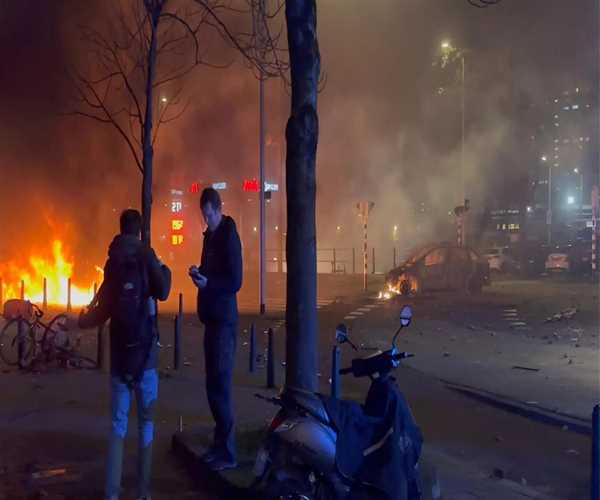
20-Feb-2024 , Updated on 2/20/2024 9:44:39 PM
Riot in Netherland involves two group clashes: Know the Update
The recent incidents in the Netherlands have been an example of a worrying tendency of fights between two rival Eritrean groups, evolving into riots in which the police were involved. The clashes reveal greater rifts within the Eritrean diaspora, while also reflecting on the complexities of the situation and its consequences. Let’s see more in detail.
The Riots in The Hague: A Snap-off
The riots in the Netherlands’s Hague were a result of a violent clash between the two Eritrean groups that later pitted them against the police. Preliminary reports suggest that fighting led to the setting ablaze of police cars and a bus, with social media streams carrying videos and images showing the intensity of the confrontations. Besides, rioters used tear gas by the police to scatter them and they did that in acts of violence like throwing bricks and stones at the police.
Understanding the Root Causes
The clashes originated from a meeting that a group of partisans in the Eritrean government held, and this meeting was interrupted by a group of individuals who opposed the current regime in Eritrea. This incident confirms not-so-hidden ideological forks amid the Eritrean diaspora supportive of the government and the ones opposed to it to the extent. Such types of divisions commonly occur in the context of cultural or political occasions, thus worsening the situation.
Broader Context: The Eritrean Diaspora Dynamics in Europe
The riots in The Hague do not represent an isolated incident but instead, serve to demonstrate the broader pattern of violence involving Eritrean communities in Europe. A similar clash was witnessed in cities like Stuttgart and Giessen in Germany and Tel Aviv in Israel, which only shows the transnational nature of these conflicts. Tens of thousands of Eritreans have turned to Europe for protection after living under allegations of oppression on a presidential level that is the government of Isaias Afwerki. Nevertheless, separations within the Eritrean community also exist in exile as it illustrates that there are various views on how the political landscape in Eritrea should be.
Implications and Challenges
The city council has considerable tasks in the face of the unrest in the Hague for its mandate of preserving law and order. The employment of tear gas and burning of vehicles depict the complexity of the situation and more flare-ups are waiting to happen if underlying issues remain unresolved. Also, it makes one wonder about the integrative efforts and the role of transnational politics on immigrant communities, because of the participation of Eritrean diaspora members in these conflicts.
Seeking Peaceful Solutions: The Strong Arguments for Dialogue
Conflicts and riots may attain momentary spotlight but they provide no enduring solution to the underlying problems that the Eritrean diaspora is dogged with. If people resort to violence, it would only further avenues of conflict which will further polarize the community and aggravate the tension. Indeed, nothing is durable other than peace it can had using dialogues and calls for sustainable development. Through the creation of an atmosphere that promotes dialogue and encourages identification and conflict resolution, stakeholders can deal with grievances, and narrow the divide. and plot the road to reconciliation. Dialogue serves as the tool to bring all voices together in one place, thus unifying them, and creating peace and harmony inside the Eritrean diaspora and larger structured society.
Engaging Community Leadership and Empowerment
Although effective community transformation and the contribution of the Eritrean diaspora members toward lasting peace are crucial, they must not be forgotten. Through prompting local grassroots initiatives and fostering spaces of community-led dialogue, participants can internalize and actively participate in reconciliation. Education programs that enhance intercultural mediation, conflict resolution skills, and civic engagement contribute to the establishment of resilient communities that can negotiate complex power structures in ways that encourage solidarity and peace. Generally, it is at the local level that the real lasting solutions necessary for peace and unity can be realized, all for a better, more inclusive future for all the Eritreans Diaspora in Europe.
Moving Forward: Overcoming Division and Fostering Dialogue
To ensure that no future conflicts occur, we must focus on addressing the factors underlying the internal schisms in the Eritrean diaspora. Different factions can be brought together to develop dialogue, help enhance the sense of community belonging, and give opportunities for the community to be actively involved in development issues relating to politics in Eritrea. Meanwhile, local authorities, including civil society and organizations, participate in arranging negotiations and peace processes to end the violence.
Conclusion
The riots that Eritrean groups who were against each other in the Hague illustrate how dynamic within Eritrean diaspora in Europe can be. Looking upon the major causes of division and the solutions to some pain points are the key elements in the process of building peace and harmony. Through dialogue and reconciliation involvement of stakeholders, the conflict in Europe can be resolved and the citizens can be advised on how to live in harmony.

Content writer
I am a content writter !
Join Our Newsletter
Subscribe to our newsletter to receive emails about new views posts, releases and updates.
Copyright 2010 - 2026 MindStick Software Pvt. Ltd. All Rights Reserved Privacy Policy | Terms & Conditions | Cookie Policy